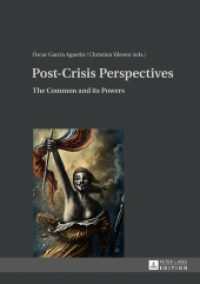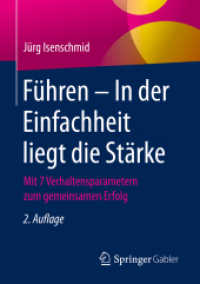- ホーム
- > 洋書
- > ドイツ書
- > Humanities, Arts & Music
- > Philosophy
- > general surveys & lexicons
Full Description
This book, achieved in cooperation with the Academic Alliance for Reconciliation Studies in the Middle East and North Africa (AARMENA), focuses on peacebuilding, conflict transformation, and shifts toward approaching the reconciliation process as an inter-, trans- and multidisciplinary field. The research presented in the series focuses on the Middle East and North Africa, highlighting contributions by practitioners and scholars alike.
The book is divided into five sections:
Sections 1: Theoretical and Philosophical Framework
Section 2: Digital Humanities on Reconciliation, Conflict Transformation, and Peace Studies
Section 3: Research Science on Reconciliation, Conflict Transformation, and Peace Studies
Section 4: Practices of Studies on Reconciliation, Conflict Transformation, and Peace Studies
Section 5: Cases Studies on Reconciliation, Conflict Transformation, and Peace Studies
The book's first part focuses on theories and the philosophical framework for the research on reconciliation, conflict transformation, and peace studies. The second part of the book is dedicated to digital humanities development in the reconciliation and peace education field, its impact on the reconciliation process in societies, and the introduction of Artificial Intelligence in analysis techniques to differentiate and identify research in different domains. The book's third part is dedicated to the research on reconciliation and conflict transformation in different disciplines. The fourth part concentrates on the practices in the field, and the fifth part illustrates case studies on reconciliation, conflict transformation, and peace studies.
The target audience is professors, scholars, practitioners, students, and scientists that are experts in the field of Middle East and North Africa.
Contents
Applied Phronesis for Reconcilaitoin Conflict Transformation and Peace Studies.- Reconciliation Proces.- The Praxis of Peace and Conflict Studies: the field of Genocide Studies.- Theodor Adorno: Peace Education after Auschwitz.- Are the New Enemies of Liberal Democracy in the sense of Karl Popper still the same but only free of Ideology.- Healing the Past Honestly: Building a Morally Responsible Theory and Practice of Reconciliation.- Particular problems of reconciliation between nations in East Asia after development and democratization Toyomi Asano.- Internet of Things for Reconciliation Process in digital humanities.- A comparative study for the traffic predictions in smart cities using Artificial intelligence techniques.- Influence for online education on higher education institutions usingNetnography.- Ethical Conducts & Regulation for Using Artificial Intelligence Application in The Higher Education Institutions in Jordan.- Why Islamists in Turkey did not engage in armed struggle: Reflecting on State Capacity, Elite Networks, and Ideological Hybridization inside and outside reconciliation.- The relationship between politics and religion or state and society in the arab Islamic world is an example.- The Homeland Perception of 2nd Generation Syrians in Turkey with the Context of Social Reconciliation Approach.- Palestinian Youth Attitudes Toward National Reconciliation: A Field Study of a Group of Palestinian Youth in the Gaza Strip.- National reconciliation in the Mena region: the Moroccan exception.- Abrahamic collaboration in the Levant in the field of natural resource exploitation and production.- Imagination and action. The foundations of an ethic of nonviolence in the thought of Abraham Joshua Heschel and Judith Butler.- The Paradoxe of Peacemaking and Conflict-making by the Nobel Peace Prize Holders: A case study of Malala Yousafzai-Pakistan and Tawakkul Karman-Yemen.- Reconciliation is central to the understanding of sustainable transformationsand resilient ecosystems.- Negotiation, mediation, arbitration, and reconciliation and theoretically comparing the distinct characteristics of these processes on reconciliation within the wider field of peace studies and conflict resolution.- Role of Prekṣā Meditation and Yoga in the Process of Reconciliation.- The gradual transformation of the international law of peace in light of reconciliation and peace studies.- China's Policy Regarding Libya's Inclusion in the Belt and Road Initiative: Sights Set on the Future.- Security in reconciliation.- Social Innovation of Awra Amba Utopian Co-immunity.- Development Instruments as tools for Conflict Transformations.- Reconciliation in Lusophony Pentecostal Migrant Churches:Perspectives from Germany.- Social inclusion as a mechanism of social reconciliation.- How did transnational media promote peacebuilding.- The prospects of transitional justice in Libya.








